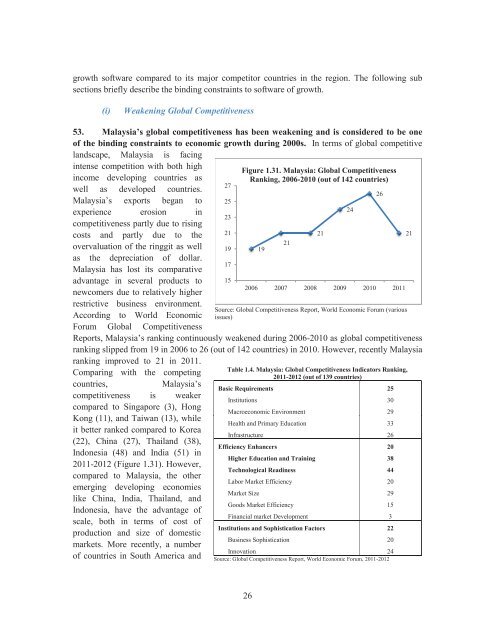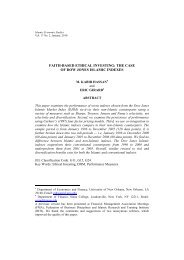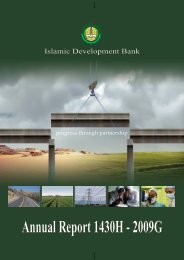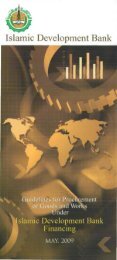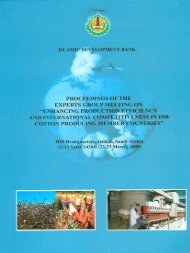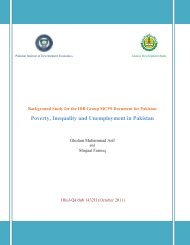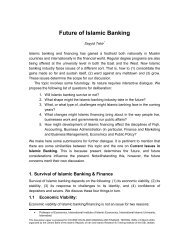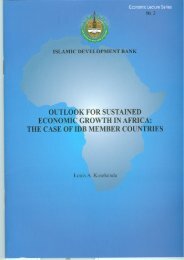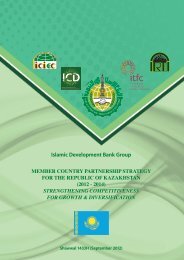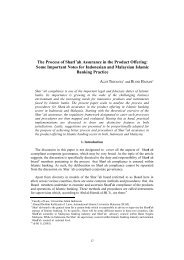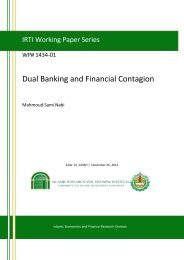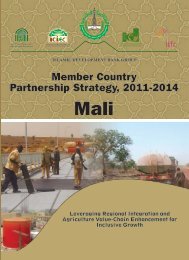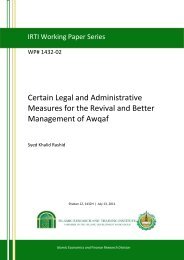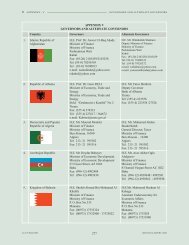Country Economic Work for Malaysia - Islamic Development Bank
Country Economic Work for Malaysia - Islamic Development Bank
Country Economic Work for Malaysia - Islamic Development Bank
Create successful ePaper yourself
Turn your PDF publications into a flip-book with our unique Google optimized e-Paper software.
growth software compared to its major competitor countries in the region. The following sub<br />
sections briefly describe the binding constraints to software of growth.<br />
(i)<br />
Weakening Global Competitiveness<br />
53. <strong>Malaysia</strong>’s global competitiveness has been weakening and is considered to be one<br />
of the binding constraints to economic growth during 2000s. In terms of global competitive<br />
landscape, <strong>Malaysia</strong> is facing<br />
intense competition with both high<br />
income developing countries as<br />
well as developed countries.<br />
<strong>Malaysia</strong>’s exports began to<br />
experience erosion in<br />
competitiveness partly due to rising<br />
costs and partly due to the<br />
overvaluation of the ringgit as well<br />
as the depreciation of dollar.<br />
<strong>Malaysia</strong> has lost its comparative<br />
advantage in several products to<br />
newcomers due to relatively higher<br />
restrictive business environment.<br />
According to World <strong>Economic</strong><br />
Forum Global Competitiveness<br />
27<br />
25<br />
23<br />
21<br />
19<br />
17<br />
15<br />
Figure 1.31. <strong>Malaysia</strong>: Global Competitiveness<br />
Ranking, 2006-2010 (out of 142 countries)<br />
19<br />
21<br />
Source: Global Competitiveness Report, World <strong>Economic</strong> Forum (various<br />
issues)<br />
21<br />
2006 2007 2008 2009 2010 2011<br />
Reports, <strong>Malaysia</strong>’s ranking continuously weakened during 2006-2010 as global competitiveness<br />
ranking slipped from 19 in 2006 to 26 (out of 142 countries) in 2010. However, recently <strong>Malaysia</strong><br />
ranking improved to 21 in 2011.<br />
Comparing with the competing<br />
countries,<br />
<strong>Malaysia</strong>’s<br />
competitiveness is weaker<br />
compared to Singapore (3), Hong<br />
Kong (11), and Taiwan (13), while<br />
it better ranked compared to Korea<br />
(22), China (27), Thailand (38),<br />
Indonesia (48) and India (51) in<br />
2011-2012 (Figure 1.31). However,<br />
compared to <strong>Malaysia</strong>, the other<br />
emerging developing economies<br />
like China, India, Thailand, and<br />
Indonesia, have the advantage of<br />
scale, both in terms of cost of<br />
production and size of domestic<br />
markets. More recently, a number<br />
of countries in South America and<br />
Table 1.4. <strong>Malaysia</strong>: Global Competitiveness Indicators Ranking,<br />
2011-2012 (out of 139 countries)<br />
Basic Requirements 25<br />
Institutions 30<br />
Macroeconomic Environment 29<br />
Health and Primary Education 33<br />
Infrastructure 26<br />
Efficiency Enhancers 20<br />
Higher Education and Training 38<br />
Technological Readiness 44<br />
Labor Market Efficiency 20<br />
Market Size 29<br />
Goods Market Efficiency 15<br />
Financial market <strong>Development</strong> 3<br />
Institutions and Sophistication Factors 22<br />
Business Sophistication 20<br />
Innovation 24<br />
Source: Global Competitiveness Report, World <strong>Economic</strong> Forum, 2011-2012<br />
24<br />
26<br />
21<br />
26


